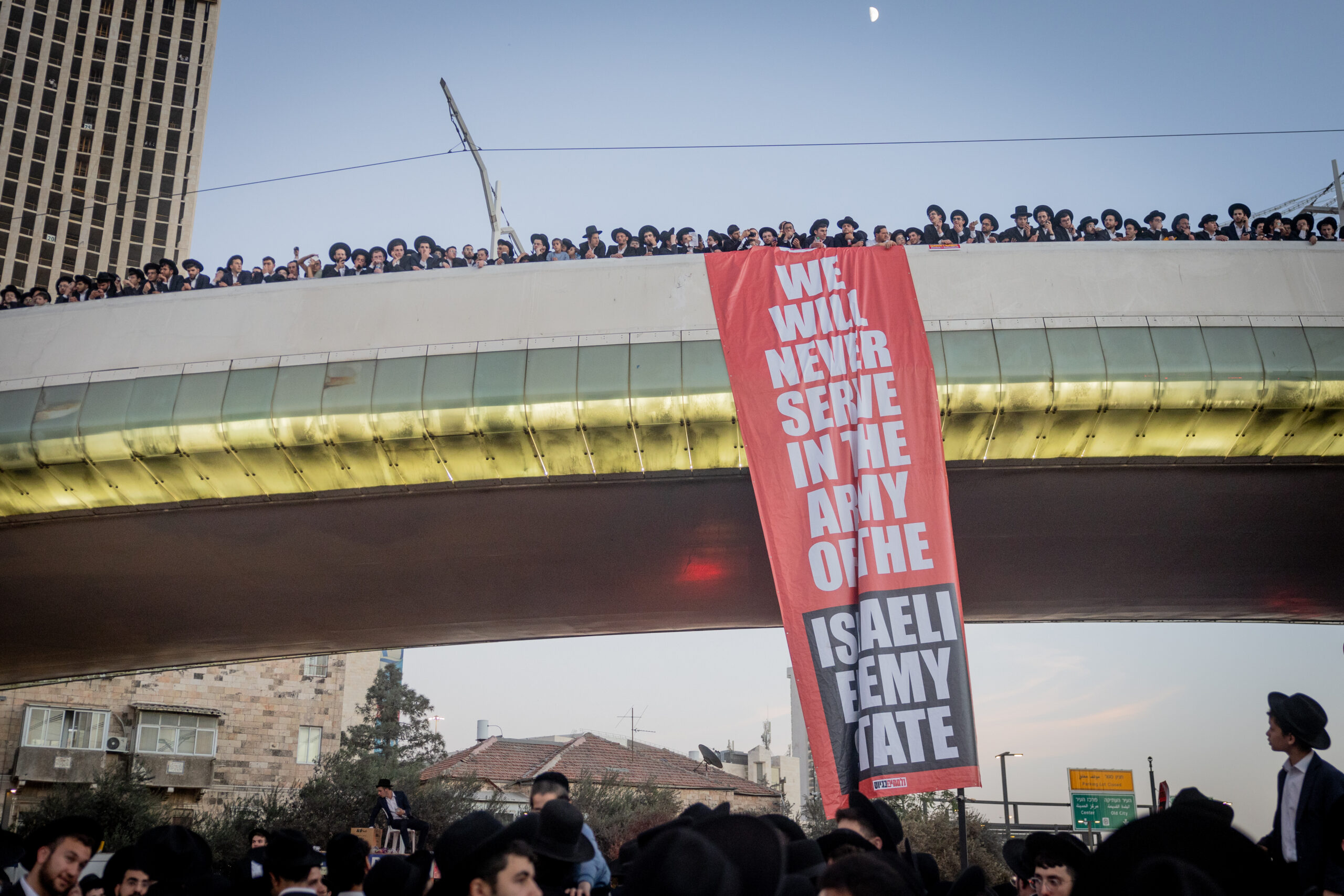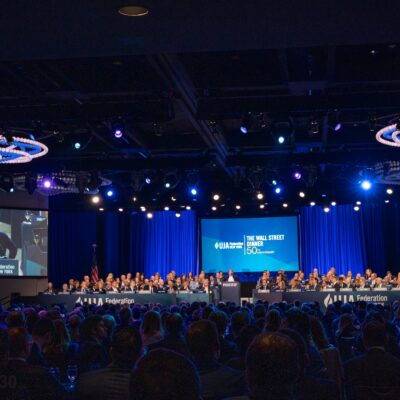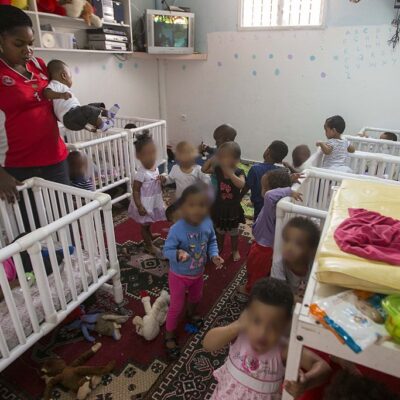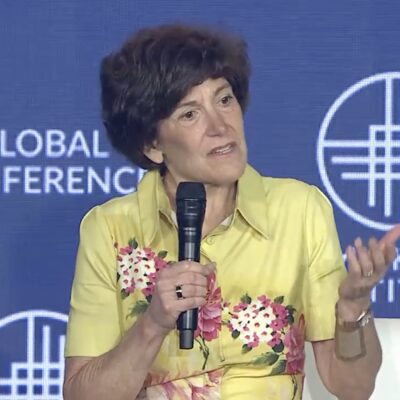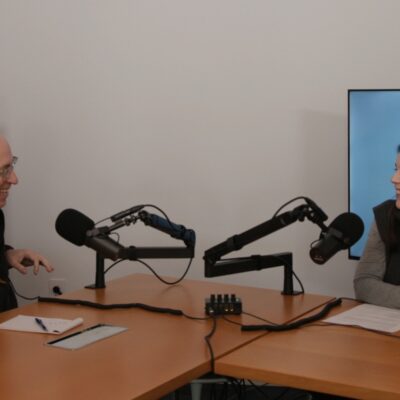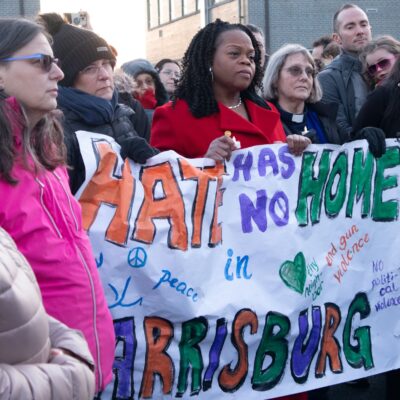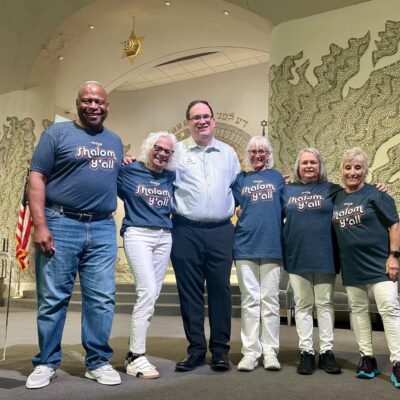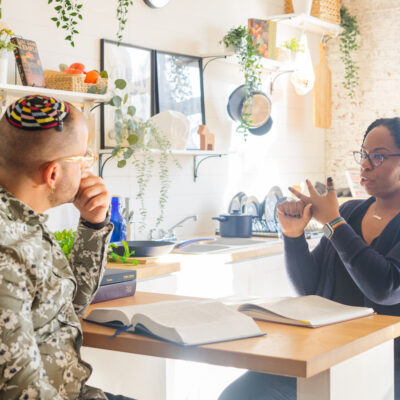Jewish Federations
Herzog unveils new dialogue initiative, ‘Voice of the People,’ at JFNA General Assembly
Prime minister decides not to address gathering; demonstrators rally outside – and at times inside – the event, with support from some attendees

Courtesy/Jewish Federations of North America
Israeli President Isaac Herzog gives thumbs up at the Jewish Federations of North America's General Assembly in Tel Aviv on April 23, 2023.
TEL AVIV — Israeli President Isaac Herzog announced the launch of a new initiative aimed at improving dialogue within the Jewish people and identifying new young Jewish leaders at the opening session of the Jewish Federations of North America’s General Assembly in Tel Aviv on Sunday night.
The General Assembly, which lasts through Wednesday, is being held in Israel this year, as it is every five years, though in this case the organizers decided to hold it in the spring instead of the fall to give attendees the opportunity to mark Israeli Memorial Day, Yom Hazikaron, and Independence Day, Yom Ha’atzmaut. The gathering also comes during a time of heightened tensions in Israel as regular demonstrations have rocked the country for the past four months over the government’s proposed judicial overhaul.
Those protests spilled over into the General Assembly, with hundreds of demonstrators chanting and holding signs and flags outside the opening gala in Tel Aviv’s expo center – and in some cases inside as well.
Israeli Prime Minister Benjamin Netanyahu, who was invited to speak at the event on Sunday night, bowed out hours before the start of the gala. His decision became one of the main topics of discussion by attendees, with some telling eJewishPhilanthropy that they saw it as a positive development as it removed a potential point of friction and discomfort, while others considered it a missed opportunity, both to hear from the premier and to give the attendees an opportunity to experience Israel’s current political debate first-hand.
In her remarks, JFNA chair Julie Platt referred to the protesters outside the venue, who could at times be heard in the main hall. “To the protesters, we see you, we hear you and we are inspired by your love of Israel,” Platt said, prompting a standing ovation from the crowd.
The gala event was not only hosted by the JFNA but by the World Zionist Organization, which held a congress last week; the Jewish Agency for Israel, which held a board of governors meeting earlier in the day; and Keren Hayesod, which is holding its annual conference this week.
Herzog noted these current contentions in his remarks, as well as fraying ties between Israel and Diaspora Jewry.
“I am convinced that there is no greater existential threat to our people than the one that comes from within: our own polarization and alienation from one another,” he said.
Herzog’s proposal to address those rifts was “Kol Ha’am—Voice of the People: The President’s Initiative for Worldwide Jewish Dialogue,” which was developed jointly by his office, the Jewish Agency for Israel and the World Zionist Organization. The Jack, Joseph and Morton Mandel Foundation provided the initial stage of funding, the president’s office said.
Herzog said the initiative is meant to serve as a “Jewish Davos” and a “global Jewish beit midrash,” a house of study, where Jews from around the world can gather and debate – not necessarily reach consensus.
“Disagreement — rather than pushing us apart — can be the force that builds us and binds us,” he said, quoting Pirkei Avot 5:17, “Every dispute that is for the sake of Heaven, will in the end endure.”
Herzog said the goal of Kol Ha’am was both to improve dialogue and to identify and develop young Jewish leaders.
“I consider this to be its most important function. We need our best and our brightest to show up on the front lines for our people. To pool their resources of vision, courage, and capability to help position our nation to survive and to thrive,” Herzog said.
To develop this initiative, Herzog’s office said it will work with the international consulting firm Deloitte to hold a series of “strategic labs” in “fourteen major Jewish centers, across six continents, and contribute to his vision of a global council for Jewish dialogue.”
These sessions will be held over June and early July in Israel, New York; Miami; Chicago: Los Angeles; Mexico City; Toronto; Buenos Aires, Argentina; São Paolo; Johannesburg; London; Paris; Budapest and Melbourne, Australia, and in virtual labs in Hebrew and English, his office said.
The General Assembly this year was deliberately kept low on content this year in order to offer the attendees more opportunity to experience Israel’s 75th Independence Day commemorations, JFNA President and CEO Eric Fingerhut told eJP ahead of the event.
The only formal programming is being held on Monday, including a tense session titled “A Jew is a Jew is a Jew: The Law of Return and Defining What Qualifies as ‘Jewish Enough,’” which included a panel with Knesset Member Simcha Rothman of the Religious Zionism party, who is one of the architects of the government’s proposed judicial overhaul, as well as Yohanan Plesner of the Israel Democracy Institute and Alex Rif, the founder and CEO of the One Million Lobby, which represents the interests of Russian-speaking Israelis.
The session, which did not directly deal with the proposed reforms, was repeatedly interrupted by protesters – some Israelis, some visiting attendees – most of whom were escorted out by security. Following repeated disruptions, the organizers called for a short break and asked attendees to not interrupt again. Though the panel was able to continue, it was again disrupted several more times before coming to a close.
Meanwhile, the other sessions being held at the same time were far more collegial, attendees said.
“It was like a tale of two GAs,” National Council of Jewish Women CEO Sheila Katz told eJP.
At the session, “Celebrating the Racial and Ethnic Diversity of the Jewish People,” Paula Pretlow was honored for being selected as the next chair of the board of the Harry and Jeanette Weinberg Foundation.
“It was all about inclusivity and acceptance,” said Katz, who on Saturday night gave the first English-language address at the weekly protest in Tel Aviv against the proposed judicial overhaul.
In the afternoon, opposition leader Yair Lapid appeared before the main plenary. He opened his speech with a not-so-subtle critique of Netanyahu’s decision to cancel his appearance, saying it was “good to be here… unlike some others,” which drew chuckles from the crowd. Lapid then reiterated a call he made to U.S. Jewish leaders in New York earlier this month, stressing the importance of the Israel-Diaspora relationship.
At the end of the afternoon plenary, the delegates boarded buses and traveled to the Latrun memorial site, where they were scheduled to commemorate Yom Hazikaron with participants of Masa.

 Add EJP on Google
Add EJP on Google